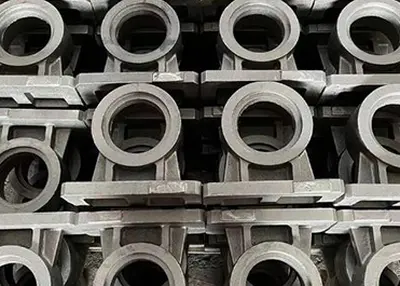The complexity of global supply chains is increasing, and companies need to be thoughtful when choosing partners. Especially in the manufacturing and processing fields, choosing the right supplier has a huge impact on product quality, cost and delivery time. It is no accident that processing suppliers in developed coastal areas are increasingly favored in this field. This article will explore why more and more companies are choosing to find processing suppliers in coastal areas, and explain the wisdom of this choice.
If you are an efficient and qualified purchasing staff or boss, you need to read my article, which will break your inherent thinking about supply chain and business management. First, let's think about the following points together:
The global division of labor is a key concept in today's global economy. It refers to different countries or regions undertaking specific production links in specific industries or fields to achieve the optimal allocation of resources and improve overall economic efficiency. Here are some important reasons why we want to globalize the division of labor:
Different parts of the world have different resource advantages, such as natural resources, labor force, technical level, etc. Through the global division of labor, the resources of various countries can be fully utilized to achieve maximum benefits.
Finding the most competitive production links on a global scale can reduce overall production costs. For example, some countries may have lower labor costs, while others may have advanced technical equipment.
The global division of labor encourages countries to focus and invest in their own areas of expertise, thereby promoting the continuous innovation and development of technology, which is a manifestation of the competitiveness of enterprises.
Through the global division of labor, products can be quickly promoted on a global scale, expanding the sales market and improving the profitability of enterprises.
The global division of labor requires close cooperation between all parties, which helps to promote international economic and cultural exchanges, and also promotes the development of international relations.
Decentralized production links in different countries or regions can reduce the impact of emergencies in a certain region on the entire industrial chain and improve the stability of the supply chain.
Countries have their own expertise and characteristics in different fields, and through division of labor and cooperation, they can achieve economic complementarity and make the overall economy more competitive.
The local supply chain may face some difficulties in meeting the needs of enterprises, and here are some possible reasons:
Some regions may lack specific resources or technical expertise, making it difficult to find a specific product or service locally.
There may be higher costs in the local market, such as labor costs, raw material prices, etc., which may make it uneconomical to find suitable supply chain solutions locally.
Advanced technologies in specific fields may not be readily available in local supply chains, which may limit the quality or innovation of products or services.
Local supply chains may not be able to meet the demand for fast delivery, especially for international markets.
Some regions may be affected by weather, political, economic and other factors, making local supply chains less stable than global supply chains.
In a particular industry or sector, the local supply chain may lack specialized production or service capabilities to provide high-quality solutions.
Business needs may change as the market changes, and the local supply chain may not be able to adapt flexibly to this change.
Corporate procurement is limited to the local supply chain for the following reasons:
For international markets, companies may lack adequate sources of information and understanding, leading to reliance on local supply chains.
Cross-border sourcing may involve different cultures and languages, which can be a major obstacle for companies sourcing in international markets.
Companies may be worried about the risks brought by international procurement, such as cargo transportation, legal disputes, etc., so they tend to choose a relatively stable local supply chain.
International logistics may involve complex customs procedures, transportation time and other issues, which may deter companies from international procurement.
Businesses may have limited knowledge of international market needs, trends, competition, etc., and therefore prefer to source in familiar local markets.
Establishing partnerships in international markets may require more time and resources, and companies may find it more difficult than local supply chains.
Sometimes companies may hesitate to choose processing suppliers in coastal areas. Here are the possible reasons:
Coastal areas may have higher production costs, such as labor costs, land rents, etc., making some companies tend to look for more economical processing partners in inland areas.
Coastal areas may be affected by weather, traffic and other factors, which may cause inconvenience or delay in logistics and transportation, making businesses discouraged.
Coastal areas may be more vulnerable to natural disasters or political factors, which may cause companies to worry about the stability of their supply chains.
Businesses in coastal areas may have different cultural and linguistic backgrounds, which may increase communication barriers and lead businesses to choose more familiar local suppliers.
Companies may be worried that the technical level or product quality of suppliers in coastal areas cannot meet their own standards, so they choose to find local partners.
Coastal processing enterprises are favored by overseas customers for the following reasons:
Coastal areas usually have well-developed ports and logistics networks, which facilitate the fast and efficient transportation of goods, allowing the delivery needs of overseas customers to be met.
Processing enterprises in coastal areas often have advanced manufacturing technology and equipment, which can provide high-quality and high-precision processing services to meet customers' high requirements for product quality.
Processing enterprises in coastal areas usually have high production efficiency and can complete large-scale orders in a short period of time, providing customers with fast delivery cycles.
Coastal areas usually have a complete supply chain system, which can ensure a stable supply of raw materials, thus ensuring the continuity and stability of production.
Businesses in coastal areas are generally more Internationalization-minded, have extensive foreign trade experience, and are better able to understand and meet the needs of overseas customers.
Businesses in coastal areas often adhere strictly to international quality and safety standards and are able to provide customers with products and services that meet international standards.
Companies in coastal areas may cover multiple industries and fields, and customers can find multiple processing companies that meet different needs in the same area, providing more options.
After thinking about the above 5 questions, let's explore why processing companies are more willing to undertake overseas orders. Let's analyze from a more practical situation.
The reasons why processing enterprises are more willing to undertake overseas orders mainly include the following points:
Overseas markets usually have a broader market space, which can provide more orders and business opportunities and help enterprises achieve large-scale development.
Compared with the domestic market, overseas orders are often more stable, which can ensure the stable operation of the company's production line and improve capacity utilization.
Overseas customers come from different countries and regions, and their demand for products is more diversified, which provides processing enterprises with greater production and product design space.
The quality and technical requirements of products in overseas markets are usually more stringent, which prompts processing enterprises to continuously improve their technical level and product quality, which is conducive to the improvement of the overall strength of enterprises.
Compared with some domestic markets, the currencies of overseas markets are relatively stable, which reduces the uncertainty of foreign exchange fluctuations on corporate earnings.
Cooperation with overseas customers can accumulate rich experience in international cooperation and cultivate enterprises' awareness and operation ability of the international market.
By cooperating with overseas customers, the products and brands of processing enterprises will be more widely recognized, which will help enhance the brand influence and reputation of enterprises.
To sum up, processing enterprises are more willing to undertake overseas orders because overseas markets have larger market size, stable orders, diversified demand and high requirements for product quality and technical level. This makes overseas cooperation an important strategic direction for processing enterprises to achieve sustainable development.
When we analyze these situations from the perspective of the future, we may ask ourselves, will their prices be high? Are scattered orders willing to accept? Is it too troublesome not to have a local supply chain? When we don't try, we don't believe in our own arbitrary guesses. Then here I simply list a few advantages of processing foreign trade enterprises for your reference.
Coastal areas often have well-developed ports and logistics infrastructure, which means that the transportation of raw materials and the distribution of finished products are more efficient. This can greatly reduce transportation costs and time, ensuring that products are delivered to customers on time. In addition, the density of the logistics network also helps to cope with potential supply chain disruptions and improve supply chain reliability.
Coastal areas often have more advanced manufacturing technologies and processes. This means that suppliers found in these areas tend to have higher production efficiency and lower defective rates. The highly competitive environment forces suppliers to constantly innovate and improve product quality, which is a clear benefit for customers.
Choosing suppliers in coastal areas can also bring the benefits of supply chain diversity. Suppliers in different geographical locations can spread latent risks and reduce the impact of production disruptions caused by natural disasters or political factors. This diversity helps companies better manage risks and ensure supply chain stability.
Many places along the coast are also committed to sustainability, which makes working with suppliers in these areas an eco-friendly option. In these areas, suppliers often have easier access to green energy and adopt sustainable production methods that help reduce negative environmental impacts.
Last but not least, working with suppliers in coastal areas is often easier to communicate and understand, as these areas are more likely to have the ability to speak international languages such as English. This helps reduce communication barriers and ensures smoother cooperation.
To sum up, choosing a processing supplier in the coastal area is a wise choice. It can bring logistics advantages, advanced technology and process, supply chain diversity, eco-friendly options, and cultural and language convenience to the enterprise. Together, these advantages provide a stronger competitive advantage for the enterprise and contribute to long-term success. Therefore, when looking for processing suppliers, it may be advisable to consider looking for partners in coastal areas.
By cooperating with overseas customers, the products and brands of processing enterprises will be more widely recognized, which will help enhance the brand influence and reputation of enterprises.
To sum up, processing enterprises are more willing to undertake overseas orders because overseas markets have larger market size, stable orders, diversified demand and high requirements for product quality and technical level. This makes overseas cooperation an important strategic direction for processing enterprises to achieve sustainable development.
 Different Types of Lathe Tools for CNC Lathe Machine and ApplicationsJanuary 10, 2024What are lathe tools? What are their essential components, types and classifications? Trust Richconn as your reliable partner for CNC machining solutions.view
Different Types of Lathe Tools for CNC Lathe Machine and ApplicationsJanuary 10, 2024What are lathe tools? What are their essential components, types and classifications? Trust Richconn as your reliable partner for CNC machining solutions.view Heat Treatment of Metals: Process, Benefits, and Vital TipsMarch 15, 2024Heat treatment alters the properties of metals for different applications. The guide discusses the process, benefits, and vital tips of heat-treating metals.view
Heat Treatment of Metals: Process, Benefits, and Vital TipsMarch 15, 2024Heat treatment alters the properties of metals for different applications. The guide discusses the process, benefits, and vital tips of heat-treating metals.view Unlocking Precision: Mastering Cylindricity for Engineering ExcellenceNovember 21, 2023In the intricate world of engineering, precision reigns supreme. Enter the realm of cylindricity - a fundamental attribute dictating the perfection of cylindrical forms. Here, I guide you through an explorative journey, unveiling the essence of cylindricity, its nuanced applications in GD&T (Geometric Dimensioning and Tolerancing), and the crucial methods to measure and comprehend this vital parameter.view
Unlocking Precision: Mastering Cylindricity for Engineering ExcellenceNovember 21, 2023In the intricate world of engineering, precision reigns supreme. Enter the realm of cylindricity - a fundamental attribute dictating the perfection of cylindrical forms. Here, I guide you through an explorative journey, unveiling the essence of cylindricity, its nuanced applications in GD&T (Geometric Dimensioning and Tolerancing), and the crucial methods to measure and comprehend this vital parameter.view Types of Casting | Which One Is Right for Your Project?December 7, 2023Compare the different types of casting, from sand casting to die casting. Learn about applications and safety measures. Choose the right casting solution!view
Types of Casting | Which One Is Right for Your Project?December 7, 2023Compare the different types of casting, from sand casting to die casting. Learn about applications and safety measures. Choose the right casting solution!view What Are the Types of Metal Surface Finish?September 16, 2022Machining surface finishing is an important processing procedure in machining. Machining surface finish can play an important role in protecting and beautifying the workpiece. In machining, there are ...view
What Are the Types of Metal Surface Finish?September 16, 2022Machining surface finishing is an important processing procedure in machining. Machining surface finish can play an important role in protecting and beautifying the workpiece. In machining, there are ...view The Role of CNC Automotive Parts in Automotive IndustryJune 17, 2024CNC machining is often used for complex designs, small products and parts. With CNC machine tools, a wide range of parts can be processed more accurately.With the rapid development of the automotive i...view
The Role of CNC Automotive Parts in Automotive IndustryJune 17, 2024CNC machining is often used for complex designs, small products and parts. With CNC machine tools, a wide range of parts can be processed more accurately.With the rapid development of the automotive i...view